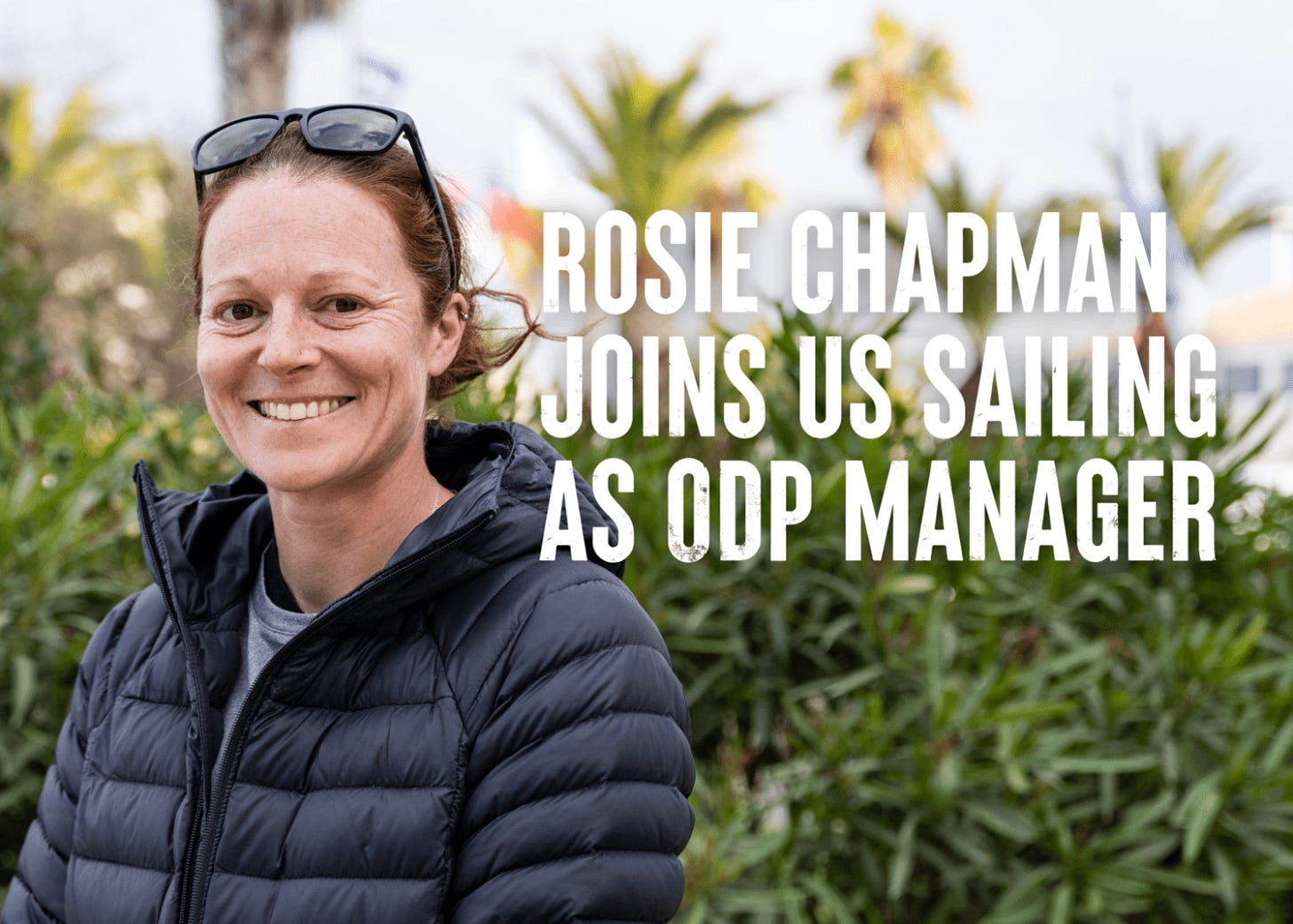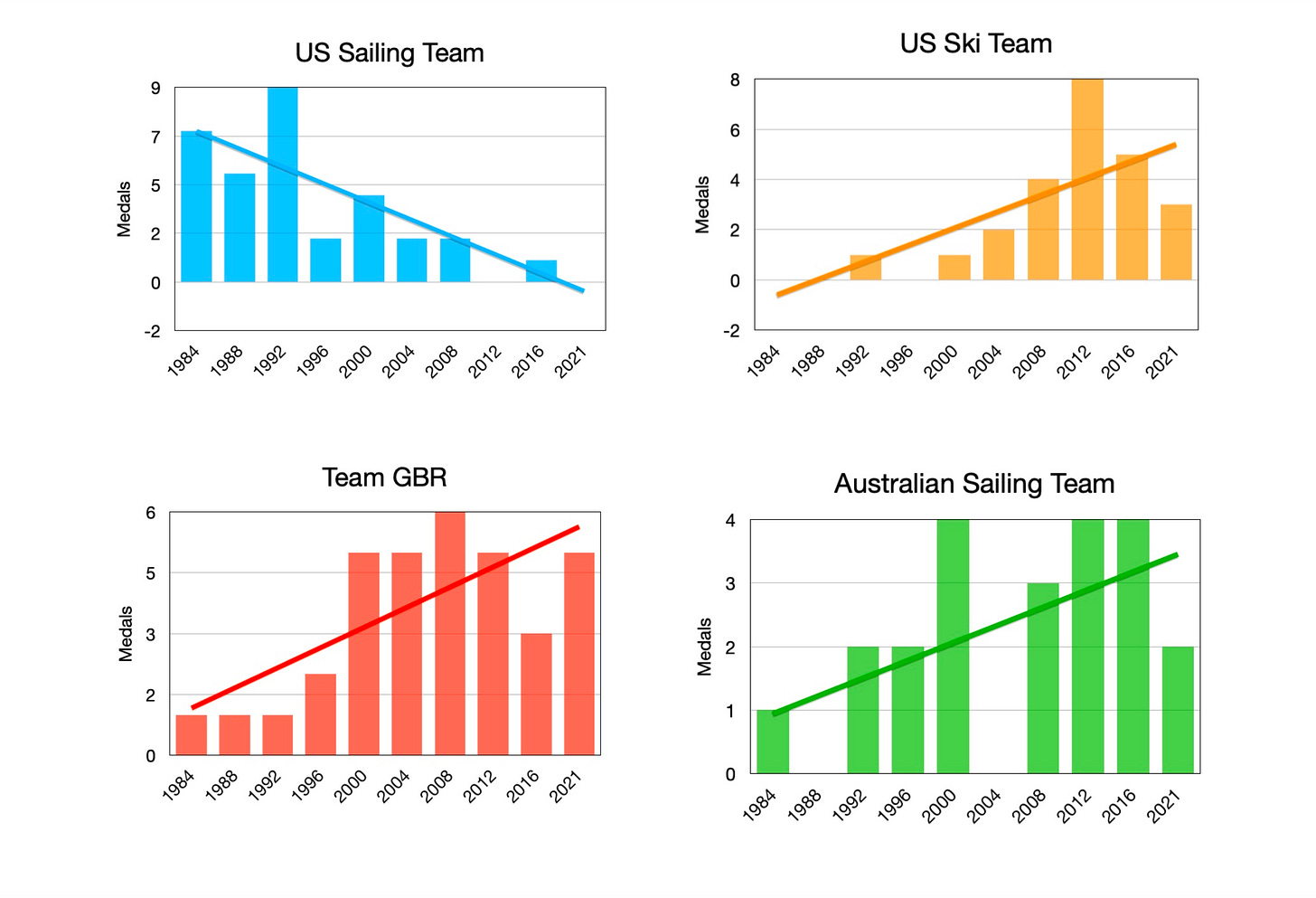The British (coaches) are coming to help restore the US Sailing program to its former glory.
With the recent hiring of Rosie Chapman to head up the Olympic Development Program (ODP), US Sailing now boasts a total of five prominent Brits making a significant impact on the team. Joining Marcus Lynch, Performance Director, Mark Asquith, 49er team coach, Dave Evans, FX coach, and Chris Rashley, women’s Formula Kite coach, Chapman adds her expertise to the new US Sailing program. Alongside the US coaches preparing and supporting the team at the Olympics, there are coaches from various other nationalities contributing to the effort.
The British Olympic program hit rock bottom at the 1996 Olympics in Atlanta, a memory many in the UK would prefer to forget. Great Britain returned with just one gold medal out of 15, placing 36th in the medal table, below countries like Belgium, Algeria, and Kazakhstan. Additionally, two British divers were forced to sell their team kit on the streets of Atlanta to recover their campaign costs—something most athletes not supported by national funding can relate to at some level.
However, this event was a turning point for the British Olympic program. Fast forward 16 years to the London Olympics, held in their home country, and the transformation was remarkable. At the 2012 Olympics in London, the British Olympic team achieved noteworthy success, finishing third in the overall medal count. They won 65 medals, including 29 gold, 17 silver, and 19 bronze medals. This impressive performance solidified Great Britain's position as one of the top-performing nations at the Games.
How did this transformation happen, and what lessons did we learn that could assist in lifting the US Sailing Team out of the aftermath of the former Performance Team's departure?
Lottery funding was the cornerstone for rebuilding the British Olympic program from scratch. Under the leadership of Peter Keen, a no-compromise approach was adopted, reshaping the British sporting landscape. Chris Boardman, the iconic Tour de France cyclist and 1992 gold medalist, succinctly captures the transformation: "My career in sport, pre-lottery, was that of a classic Alpinist. We were trying to climb this thing but weren't leaving any maps or ropes for anyone else. If anything, it's quite the reverse. That switch from one-off success to an approach with a quite different set of values is probably the single biggest difference." This contrast highlights a longstanding issue with the US Sailing program: the failure to retain knowledge and intelligence from one quadrennial cycle to the next. In contrast, the British team and others have thrived by building upon their successes and continuously improving.
From a scenario where only the occasional athlete could succeed, the British system evolved into one with an ongoing support structure. With the funding, Britain could recruit the best coaches globally and, at that time, many top sports scientists from the Australian Institute of Sport.
With lottery funding, Great Britain's cycling, rowing, swimming, and athletics programs attracted top coaches from around the world. However, Stephen Park, the performance director for GB Sailing, took a different approach and built his program from the ground up. Despite this, Park's achievements have earned him recognition on par with directors from more established Olympic sports, and he has built on every new wave of success to bring through a new generation of talent. (Park is now the performance director for the British Cycling).
Fun fact: As many as 50% of the Tokyo sailing medals were coached by Brits. The British Sailing Team won twice as many medals (6) as the next best country.
The US Sailing Olympic Program has lagged in its pursuit of professionalism. It has failed to adopt the British model of recruiting and retaining coaches and support staff with proven track records outside the US Sailing bubble. Rather, it has been held back by a systemic policy prioritizing internal connections and relationships over the merit and expertise of external sources.
The New US Sailing DNA
However, recent developments indicate a shift in the right direction. With the restructuring of the Board of Directors, the hiring of a professional CEO, and the crucial decision to prioritize the Olympic program, US Sailing has taken significant steps and demonstrated a commitment to building an organization that will flourish.
The legendary Lord Sebastian Coe, a four-time Olympic track medalist and the head of the 2012 London Olympics Organizing Committee, succinctly states the four things needed to succeed in the Olympic arena: "Smart governing bodies, world-class coaches, talented athletes with a good sense to pick their parents carefully, then you need predictable levels of funding."
US Sailing Scorecard To Date:
Smart governing body: Credit is due for taking a significant step forward by seeking talent outside the traditional bubble and bringing in proven personnel. However, overcoming past failures and changing public perceptions will be challenging. With the LA2028 home Olympics looming, there's added pressure to overcome organizational hurdles and plan effectively for the upcoming quad. Hopefully, this serves as motivation to exceed expectations.
World-class coaches: Marcus Lynch, the new High-Performance Director, has hit the ground running and has assembled a strong coaching and support staff for the lead-up to the Olympics. Post-Olympics, his careful selection of the 2028 coaching staff will be crucial.
Talented athletes: The US boasts a deep pool of talented sailors, as evidenced by their strong performances. American sailors secured 2nd and 3rd place at the 2023 Optimist class world championships. Since 2016, the US Youth Worlds Team has won 9 gold medals and 15 total. However, in the last two worlds, the US medals diminished significantly, and the lack of a robust pipeline program remains a significant obstacle that Rosie must address if the US wants to compete at the top of Olympic sailing.
Predictable funding: The British Team receives the equivent of approximately $6 million US dollars in annual funding from UK Sport over the 2021-2025 period. The reported US Sailing Olympic and ODP Program budget for 2022 was $6.3 million. If the current funding is comparable to that of the British and Australian teams, then the excuse of being underfunded loses validity. The departure of the former performance team and their alleged efforts to convince donors and sponsors to join them has undoubtedly impacted the 2023/2024 budgets. The USSA Financial Report on page 6 details the operating expenses of the Olympic/ODP program. The 990 reports on page 7 details compensation for former team management and personnel.
It is crucial for US Sailing to raise and allocate funding effectively for the 2028-2032 Olympic and ODP programs. Learning from past experiences, US Sailing has brought in a proven leader and must develop a new comprehensive and strategic plan that addresses the program's long-term needs, ensures transparency and accountability in funding distribution, and prioritizes investments in athlete development, coaching, and support services. Replenishing funding with a better plan than Project Pinnacle will be essential for the success and sustainability of the US Sailing Olympic Program in the upcoming quadrennial cycle and, most importantly, bring back those donors who prematurely withdrew their support and attract new investors who can support a bold vision.
Just like the British Olympic program in 1996, the US Sailing Program is at an inflection point. It has a prime opportunity to pivot, shedding old ways and embarking on a new trajectory toward the top, as demonstrated by the British (and other teams). This level of success is within its reach.







Its probably not a coincidence that in recent years the demise of US sailing is paralleled to the reduction in sailing weight of the boats selected by World Sailing. In your day at a Finn Gold Cup, perhaps 6 out of the top 10 might be US sailors, In the Star it was similar. Nowadays with one exception if you are over 80-82 KGs, you are over weight. ATM, in the mixed 470, the helms are tiny, and the crew 6' 4", and 73 KGs these people are not normal. Body weight in the US debars many of the best US sailors from competing in Olympic sailing. In an effort to be more diverse Olympic sailing is perversely more diverse, by blocking sailing classes that cater for heavier people. I accept that Olympic athletes are not normal, they are but nature exceptional, but there are exceptional heavy sailors who can't compete in the Games.
An excellent analysis.
I live in England and my son (age 15) is a keen ILCA6 racer.
All the keen boys want to get on the ILCA7 Mens British Sailing Team (BST).
The BST has 4 members and they are full-time sailors - paid to sail. One of them, Michael Beckett, stands a good chance of winning the gold at Paris2024.
The problem is the level under this BST level - The RYA call it the British Sailing Squad (BSS).
But BSS members receive no money whatsoever - so it falls on parents to fund everything.
It's at this level that the 'pipeline' fails.